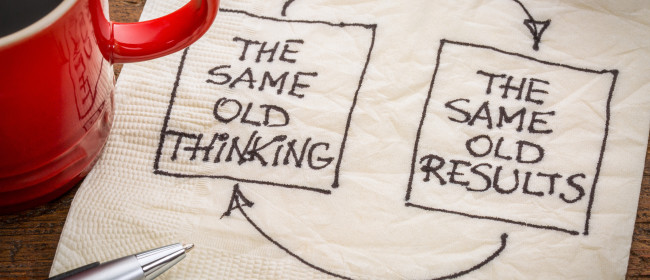When facing a new challenge, do you react with confidence, knowing that with time, effort and practice you can succeed? Or do you find yourself questioning your abilities, talent and motivation?
Do you view failure as simply part of the process? Or do you avoid challenges in order to preserve your dignity?
Is Your Mindset Working to Your Advantage or Holding You Back?
A mindset is a person’s established set of attitudes that are based on their assumptions. These assumptions predetermine a person’s reactions to and interpretations of any event, environment or situation.
Whether positive or negative, a person’s mindset is engrained, habitual and affects all aspects of his or her professional and personal life.
In her book Mindset, Stanford University psychologist Carol Dweck identifies two general mindsets: fixed and growth.
Fixed Mindset
- Talent and intelligence is static
- It’s better to avoid challenges
- It’s okay (even preferable) to quit before failure
- Effort is pointless
- Ignores useful criticism and feedback
- Views success of others as a threat
Growth Mindset
- Talent and intelligence can be developed
- Embraces challenges to grow
- Failure is an opportunity for learning
- Effort leads to mastery and success
- Uses criticism and feedback to improve
- Finds inspiration and learning from the success of others
It’s easy to tell someone to develop a growth mindset, but, if mindset is so deeply engrained, how does a person change it? Here are six ways to begin:
Six Simple Mindset Shifts to Improve Success
- Embrace failure instead of avoiding it. The faster the failure, the quicker the learning. Before starting his auto manufacturing company, Henry Ford failed at his first several businesses. What would the industrial landscape look like had he given up after his first try? Remember, embracing failure also means success can arrive that much sooner.
- Think abundance instead of scarcity. When it comes to spending money on self-improvement, many people resist due to cost. But clients and customers are attracted to people who believe in and value themselves. Instead of thinking of personal growth as an expense, think of it as an investment in your future.
- Embrace challenges. People who have a mindset of “growth” realize that challenges are just opportunities in disguise, and they choose to actively seek them out.
- Use setbacks as learning opportunities. No matter how thorough the plan, no matter how well-executed the details, obstacles will surface. Besides, who can predict with any real accuracy what setbacks will occur? Instead of wasting energy trying to prevent the unknown, why not just face obstacles as they show up?
- Don’t take it personally. Sometimes the best opportunities for personal and professional growth come from leveraging harsh criticism and negative feedback. How well do you listen to your customers’ and clients’ complaints?
- Stop re-inventing the wheel. Instead of resenting successful people for what they have accomplished, look to them to learn how they did it and turn that to your advantage.
Incorporating these simple, strategic shifts in mindset provides opportunities to experience not only tangible results (i.e., the bottom line), they also go a long way to shoring up determination, building self-confidence and encouraging action, productivity and fulfillment.
